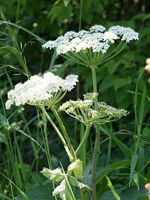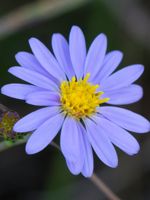Mon-Fri 9am - 5pm Mountain time
Smooth Aster vs Cow Parsnip
Heracleum maximum
Symphyotrichum laeve
CUSTOM GROW
NOT AVAILABLE THIS SEASON - MIGHT RETURN
Cow Parsnip is a native perennial wildflower known for its tall growth, very large leaves, and broad clusters of white flowers. The abundant blossoms provide nectar and pollen for a wide variety of pollinators, including bees and butterflies. Birds and small mammals feed on its seeds, while the foliage serves as a larval host for certain butterfly species.
Cow Parsnip is often among the first native perennials to establish in disturbed or open sites. It typically grows in moist meadows, along streambanks, forest edges, and roadsides. Although usually a short-lived perennial or biennial, it readily self-seeds and maintains strong populations where conditions are favorable.
Cow Parsnip is the only native Heracleum in North America and should not be confused with the highly invasive Giant Hogweed (H. mantegazzianum).
Note: The sap of the Cow Parsnip can cause phytodermatitis when exposed to ultraviolet light (sunlight). This can cause rashes or even burns. Care should be taken if pruning or handling this plant.
Smooth Aster is a native perennial wildflower known for its violet-blue, daisy-like flowers. They bloom later in the season, from late summer to early fall. The flowers attract a variety of pollinators, including bees, butterflies, and other beneficial insects. It also serves as a host plant for the Silvery Checkerspot (Chlosyne nycteis) and Pearl Crescent (Phyciodes tharos) butterflies, further enhancing its ecological value. This easy-to-grow wildflower is well suited for native wildflower gardens, pollinator gardens, and naturalization projects.
The Smooth Aster’s non-aggressive root system allows it to spread slowly, and it is more likely to reproduce by seed, which can be controlled through deadheading.
Cow Parsnip Quick Facts
Smooth Aster Quick Facts
Toxicity: sap causes skin irritation

